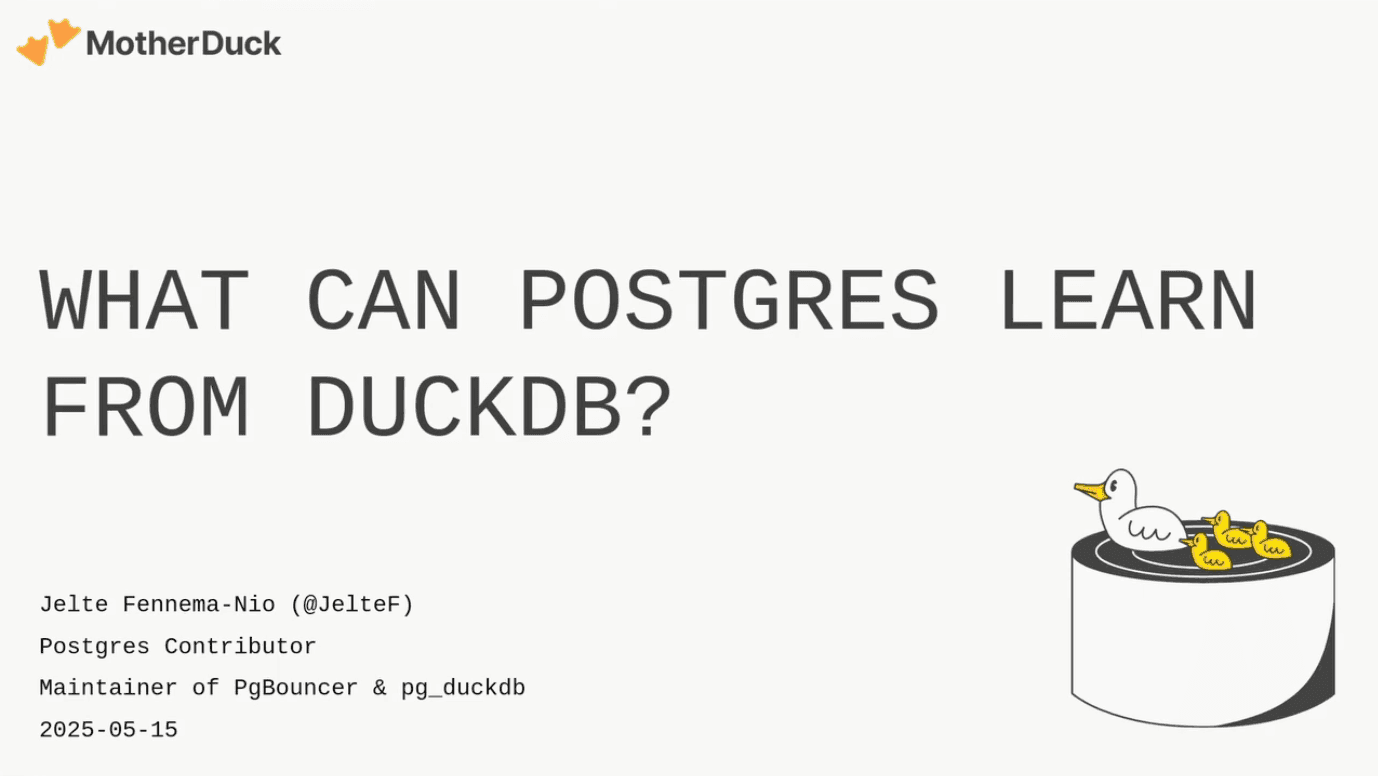DuckDB & MotherDuck for Beginners: Your Ultimate Guide
2025/02/21Why DuckDB is Revolutionizing Data Analytics
DuckDB has experienced explosive growth in popularity, with download statistics showing remarkable adoption rates, particularly in the Python ecosystem. This open-source analytical database is designed to handle everything from quick data exploration to complex data pipelines, and it's already trusted by multiple companies in production environments.
Understanding the Small and Medium Data Revolution
The tech industry has long operated under the assumption that analytics requires big data infrastructure. However, this paradigm is being challenged by three key insights:
-
Most workloads aren't big data: According to data from AWS Redshift and other cloud analytical databases, approximately 83% of users work with query sizes up to 1TB, and 94% work with data below 10TB.
-
Modern hardware is incredibly powerful: Today's single machines can handle up to 24TB of memory on AWS, making distributed systems unnecessary for most use cases.
-
Distributed systems are expensive: They require significant IO network traffic for coordination, and the development experience is considerably more complex.
DuckDB capitalizes on these realities by enabling users to work with large datasets on a single machine, whether locally on a laptop or in the cloud via a scale-up strategy.
How DuckDB Works: The In-Process Advantage
DuckDB is an open-source, in-process analytical database written in C++, designed as a single self-contained binary with all dependencies included. This architecture sets it apart from traditional databases.
Traditional Database Architecture
Databases typically fall into two categories:
-
OLTP (Online Transaction Processing): Databases like PostgreSQL and MySQL, optimized for handling transactions with small datasets. Query times typically range from 1-10 milliseconds.
-
OLAP (Online Analytical Processing): Databases like BigQuery and Snowflake, built for analytical queries processing large datasets. Query times can range from 100 milliseconds to several minutes.
Most traditional databases use a client-server architecture where the database runs as a separate process, and applications connect to it through SQL queries.
The In-Process Revolution
In-process databases run directly within the application process itself. While SQLite pioneered this approach for OLTP workloads, DuckDB introduces something new: an in-process OLAP database optimized for analytical workloads.
This design enables DuckDB to:
- Run on virtually any platform (laptops to cloud workflows)
- Integrate seamlessly with any programming language
- Execute in web browsers via WebAssembly
- Eliminate network overhead for local operations
Getting Started with DuckDB
Installation and Basic Usage
DuckDB can be installed through various methods:
- Direct binary download for CLI usage
- Package managers (Homebrew for macOS)
- Language-specific packages (Python, R, Java, etc.)
The CLI provides a powerful interface for data exploration:
Copy code
-- Simple query reading from S3
FROM 's3://bucket/path/to/file.parquet' LIMIT 5;
Key Features in Action
Friendly SQL Dialect: DuckDB extends standard SQL with productivity enhancements, such as the FROM-first syntax shown above.
Automatic File Format Detection: DuckDB automatically detects and handles various file formats including Parquet, CSV, JSON, Iceberg, and Delta Lake.
Extension System: DuckDB's functionality is modular through extensions. Core extensions (like HTTPFS for S3 access) are auto-loaded when needed, while community extensions can be installed manually.
Data Persistence and the DuckDB File Format
By default, DuckDB operates in-memory, but it offers powerful persistence options:
Creating and Managing Databases
Copy code
-- Attach or create a database
ATTACH 'mydatabase.ddb';
-- Create a table from a query
CREATE TABLE mytable AS SELECT * FROM source_data;
The DuckDB File Format
DuckDB's native file format (.ddb or .db) is:
- Self-contained (all tables and metadata in one file)
- ACID-compliant
- Highly compressed
- Optimized for analytical workloads
Exporting Data
DuckDB supports seamless data export:
Copy code
-- Export to CSV
COPY (SELECT * FROM mytable) TO 'output.csv';
Managing Secrets and Authentication
DuckDB includes a comprehensive secret management system for secure cloud access:
Copy code
-- Create temporary secret using AWS credential chain
CREATE SECRET (
TYPE S3,
PROVIDER credential_chain
);
This approach supports:
- AWS SSO authentication
- Temporary and persistent secrets
- Multiple cloud providers
- Secure credential storage
Scaling to the Cloud with MotherDuck
MotherDuck supercharges DuckDB by transforming it from a single-player to a multiplayer analytics experience. The integration is remarkably simple:
Connecting to MotherDuck
Copy code
-- Connect to MotherDuck with one command
ATTACH 'md:';
Authentication requires only a MotherDuck token, which can be set as an environment variable.
Key MotherDuck Features
Dual Execution: MotherDuck enables intelligent query execution, automatically determining whether to run computations locally or in the cloud based on data location and query requirements.
Database Sharing: Create and share cloud databases with simple commands:
Copy code
-- Create a share
CREATE SHARE myshare FROM mydatabase;
Performance Benefits: Leveraging cloud infrastructure provides:
- High-bandwidth connections to cloud storage
- Elimination of local network bottlenecks
- Seamless collaboration features
Cloud Storage Integration
MotherDuck dramatically improves performance when querying cloud storage. In benchmarks, queries that take 11 seconds locally can complete in just 2 seconds when leveraging MotherDuck's cloud infrastructure and network proximity to storage.
The Complete Analytics Toolkit
DuckDB and MotherDuck together provide:
- Simplicity: One-command installation and cloud connection
- Flexibility: Run anywhere from browsers to cloud environments
- Performance: Lightning-fast analytical queries on small to medium datasets
- Integration: Native support for numerous file formats and cloud providers
- Collaboration: Easy data sharing and team workflows
Whether you're analyzing data on your laptop, scaling computations in the cloud, or building production data pipelines, DuckDB offers a modern approach to analytics that challenges traditional big data assumptions while delivering exceptional performance and developer experience.
Related Videos

2025-09-10
From Curiosity to Impact How DoSomething Democratized Data
Hear how DoSomething's data team escaped the enterprise data trap, achieving 20X cost reduction and transforming hours-long queries into seconds with MotherDuck.
YouTube



